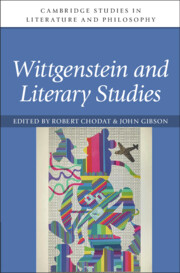Book contents
- Wittgenstein and Literary Studies
- Cambridge Studies in Literature and Philosophy
- Wittgenstein and Literary Studies
- Copyright page
- Contents
- Contributors
- Abbreviations of Wittgenstein’s Major Works
- Introduction
- 1 Writing after Wittgenstein
- 2 A Wittgensteinian Phenomenology of Criticism
- 3 Appreciating Material
- 4 A Vision of Language for Literary Historians
- 5 Wittgenstein and the Prospects for a Contemporary Literary Humanism
- 6 Storied Thoughts
- 7 Wittgenstein and Lyric
- 8 Life, Logic, Style
- 9 Wittgenstein’s Apocalyptic Subjectivity
- Index
4 - A Vision of Language for Literary Historians
Forms of Life, Context, Use
Published online by Cambridge University Press: 05 December 2022
- Wittgenstein and Literary Studies
- Cambridge Studies in Literature and Philosophy
- Wittgenstein and Literary Studies
- Copyright page
- Contents
- Contributors
- Abbreviations of Wittgenstein’s Major Works
- Introduction
- 1 Writing after Wittgenstein
- 2 A Wittgensteinian Phenomenology of Criticism
- 3 Appreciating Material
- 4 A Vision of Language for Literary Historians
- 5 Wittgenstein and the Prospects for a Contemporary Literary Humanism
- 6 Storied Thoughts
- 7 Wittgenstein and Lyric
- 8 Life, Logic, Style
- 9 Wittgenstein’s Apocalyptic Subjectivity
- Index
Summary
Wittgenstein did not address the question of history directly or extensively. But his vision of language is pervasively historical and has implications for the way we do literary history. This chapter examines the idea of use at the heart of Wittgenstein’s vision of language, especially how it differs from the question of context, and how it is related to “forms of life.” After exemplifying these concepts in Wittgenstein by revisiting some of the early remarks in the Philosophical Investigations, I explore the Oxford English Dictionary (OED) to show how the teaching of the differences in the use of words is at the heart of its practice. Finally, I highlight the work of an exemplary critic, William Empson, who regarded his work as an important corrective to the OED, and whose work is highly attuned to the history of use. The implications of Wittgenstein’s vision of language with its fundamental revision of linguistic agency show that much contemporary historical criticism is not historical enough.
Keywords
- Type
- Chapter
- Information
- Wittgenstein and Literary Studies , pp. 82 - 103Publisher: Cambridge University PressPrint publication year: 2023

